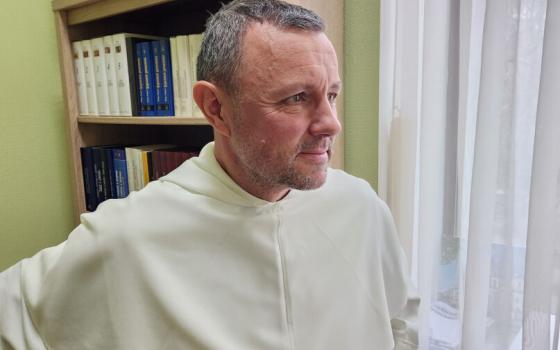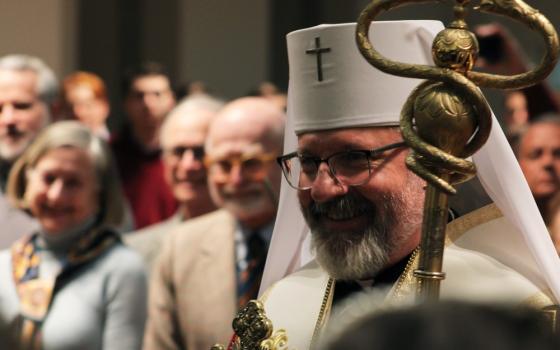Now as we try to listen for a few moments within the depths of our hearts to what God is speaking to us today, there are a number of things that we can reflect on. The first thing, I think, comes from that passage, St. Paul's letter to the Church at Thessalonica, where Paul reminded the people that God's message that they had received, they accepted it, not as some human thinking, but rather as a living power among them because they accepted what God spoke not as a human word, but as God's word.
{C}
|
I think that's something that we don't appreciate enough when we come together every week to celebrate the Liturgy. God's word is being proclaimed in our midst, and it's a powerful word. In the Letter to the Hebrews it's described as a two-edged sword. It can cut deeply into our awareness and challenge us. God's word is so important to hear, to take in, to let it form us, and yet very often, we're very casual about it. We hear the passage from one book or another of the Bible and we really don't take it as anything other than maybe some human word like other things we read or hear.
This is God's word. We ought to look forward every week, to, What is God going to be saying to me in this Liturgy? So tonight, we try to listen deeply to God's word, appreciating it not as a human word, but as God's word. In fact, it's kind of a challenging word tonight, very challenging. We're used to thinking of Jesus as being mild, gentle, compassionate, always reaching out to those who are the most vulnerable, welcoming sinners, publicans, but tonight we see the Prophet.
In fact, if you go on just a little bit further than this 23rd chapter of Matthew's Gospel, after the part we heard tonight, Jesus begins to cry out, "Woe to you, Scribes and Pharisees, you hypocrites." That's not a word we usually think of as coming from Jesus, calling the religious leaders of his day hypocrites. He goes on in passage after passage, verse after verse, calling them hypocrites. It's very much like Malachi in our first lesson tonight who challenged those priests of Malachi's time.
They weren't serving the people. They were serving themselves, and so God, through Malachi, said, "You're cursed." Jesus is speaking along these lines tonight. One thing we have to be careful of, though, is when we hear this 23rd chapter of Matthew's Gospel, we have to be careful not to think it's a passage that is condemning the Jewish people. Over the centuries, this chapter has been used as a basis for anti-Semitism in our Christian community, but it really isn't. Matthew wrote around the year 80.
What he's writing, he's drawing from what is about one or two verses in the Gospel of Mark, and he expands on it. He's speaking now to a community that has been gathered around the word and the sacrament of the Eucharist for almost 50 years now. That community, a Christian community, these words are being addressed to them. It's because they have fallen away. Do you remember the first part of the Acts of the Apostles, how the early Christian community is described as brothers and sisters?
They come together and go to the temple to pray together. They live in a community where everybody shares whatever he or she has so that no one is in need among them. It's a beautiful community of disciples of Jesus, all of whom are equal. Brothers and sisters sharing together, following Jesus deeply and carefully. Now, they've begun to bring about separations, a kind of a clericalism has come into the Church. Those who are the religious leaders want to have special places, want to have special titles, want to wear special kinds of garments, and Matthew is saying that's all wrong.
That's not the way Jesus wanted it. You're brothers and sisters. You're equal to one another. So Matthew is trying to draw them back to the way of Jesus and the way they first were. Now it isn't just Matthew's community that God is speaking to through this word. It's our community, too, our community today because God's word is a living word. It still speaks, even now. When we look about our Church -- I say this with sadness, but it's true, I think -- we have a lack of really good leadership in our Church.
I think once more, there's a little bit too much clericalism where we try to separate the clergy and laity. Only the clergy can come up on this side of the altar, not lay people and especially not women. I notice you don't pay much attention to that, so thank God, but it's happening in our Church. We're trying to set up those divisions again. There is a lack of leadership, I think, when you realize that in our country, 30 million people have walked away from the Catholic community. That's 10 percent of the U.S. population, 30 million people who were Catholic say, "I don't bother anymore."
What do our leaders do about it? They hardly avert it. They pay no attention. We ought to be reaching out, calling them back. But even more, our leadership in the Church has been terribly flawed, and I think we all know what the main reason is. It's that whole sex abuse crisis: that it happened in the first place and continues to happen, sadly enough. Our leaders covered it up, protected the perpetrators and continued to move them around from parish to parish where it would happen again.
That's a terrible loss to our Church, and the credibility of the bishops is very much diminished because we have this terrible failure. So when Jesus is speaking in the Gospel today to those leaders of the community of Matthew, he's also speaking to our leaders and to all of us, because first of all, of course, the leadership of our Church we pray will change and become more alert to what's really happening in our Church, asking why people are leaving and trying to open the Church up so they'll feel welcome again, rather than protect a perpetrator of abuse.
Make sure that it doesn't happen, can't happen again. That's what our Church leaders should be doing. But also, in this Church, if we are really listening to what God is speaking to us, you notice Matthew says to all of us, talking first of all to the religious leaders, but to all of us: "You must not allow yourselves to be called Rabbi, someone with distinction. You are all brothers and sisters." We should recognize that. We are brothers and sisters in this community of disciples of Jesus, equal in freedom and dignity.
Then, taking us back to that first Christian community where everyone took care of everyone else, he says, "The greatest among you must be the servant." There is a passage in Matthew's Gospel earlier on where Jesus has been teaching his disciples about leadership and the mother of the sons of Zebedee, James and John, comes to Jesus and says, "I want my sons to be at your right hand and your left hand in your kingdom, the top places." Jesus says to her, "No, that's not going to happen," but then he calls all the disciples together because they all are watching this, and I presume the others are resentful because James and John are trying to get the top places.
Jesus says to them very powerfully, "Look, among the Gentiles," that is, the Roman occupiers of the Holy Land at the time, "Those who are in positions of authority lord it over the others. It's a very hierarchical structured authority system where those at the top lord it over or dominate the others, but among you it cannot be that way. The one who is to be the greatest must be the servant," or the word is even "slave," of all the rest. If we're really going to follow Jesus, if we're going to really make our community come alive once more, and if we're going to be like Paul said to the Church at Thessalonica, "A Church that makes other people realize that God is living in our midst," then we have to become servants of each other within our community, but also servants in the world around us.
We're living in a world where there is extraordinary, extreme economic disparity. Archbishop Romero used to say in El Salvador, "So few have so much. So many have so little." That's not right. We have to look at what's going on around us, and recognize that there is so much that is not right. It's your job and my job as disciples of Jesus to become the servants of one another, to make sure no one is lacking as it was in the first Christian community. It's a very strong and powerful challenge that God's word gives to us today.
If we listen deeply, let that word enter into our minds first of all, but then down into our hearts to change us, then we can once more truly become a community of disciples of Jesus who will hear the word of God as the word that it is, the divine word of God, penetrating deeply into our minds and our hearts, and as we prayed at the beginning, that we'll have the strength to live that word, to carry it out, and we will become once more a community of disciples of Jesus that will bring amazement to others when they see how we love one another and carry out the words that God has proclaimed in our midst.
[Homily given at Lynn University Campus Ministry Chapel, Boca Raton, Fla.]



